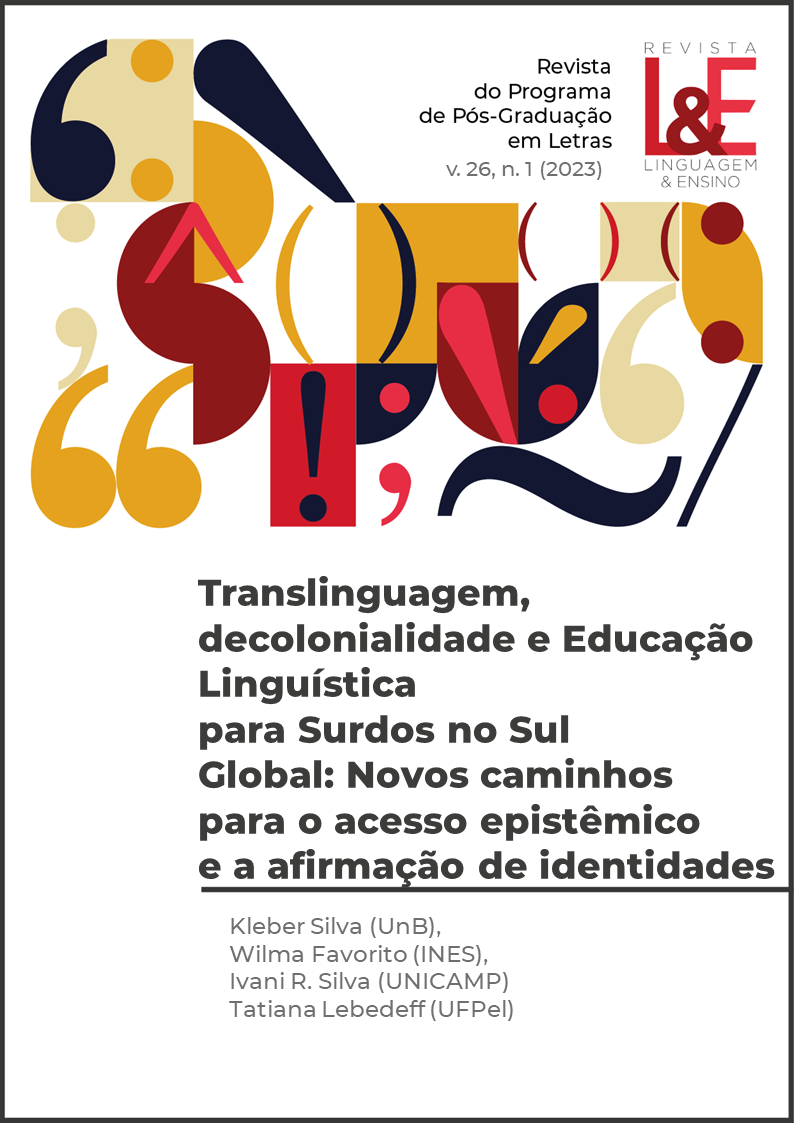Translanguaging Ubuntu
uma proposta decolonial para o multilinguismo no sul global
Resumo
As práticas educacionais do Sul Global permanecem, em geral, monolíngues, apesar dos ricos repositórios de formas locais de conhecer e ser. A translanguaging como campo de estudo deu um passo adiante para decolonizar as salas de aula de línguas e oferecer agências aos professores e um acesso mais profundo ao conhecimento aos alunos. No entanto, as interpretações desse fenômeno ainda são linguísticas baseadas em programas tradicionais de educação bilíngue. Neste artigo, exploramos o que significa translanguaging para o Brasil e para a África do Sul a fim de elaborar uma proposta de multilinguismo baseado nas competências culturais locais. Levando em conta os contextos sociolinguísticos africanos e brasileiros anteriores ao colonialismo europeu, recorremos aos repertórios culturais indígenas desses países para combater as suposições coloniais e inquestionáveis relativas à educação multilíngue em ambos os países. Reposicionamos criticamente a teoria da translanguaging ubuntu para defender a decolonização dentro e fora dos discursos de translanguaging. Recomendações pedagógicas úteis para os eventos/práticas de letramentos na perspectiva ubuntu foram fornecidas para adaptação em contextos relacionados.
Referências
BAMGBOSE, A. Language and exclusion: the consequences of language policies in Africa. Hamburg: LIT, 2000.
BLOMMAERT, J. The sociolinguistics of globalization. Cambridge: Cambridge University Press, 2010.
BROCK-UTNE, B. Language literacy and democracy in Africa. In: MAKALELA, L. (Ed.). New directions on language and literacy education for multilingual classroom in Africa. Cape Town: CASAS, 2015. p. 15-33.
BROCK-UTNE, B. Whose education for all? The recolonization of the African mind. New York: Falmer Press, 2000.
CARRUTHERS, J. Mapungubwe: an historical and contemporary analysis of a World Heritage cultural landscape. Koedoe, v. 49, n. 1, p. 1-13, 2006.
CAVALCANTI, M. C.; MAHER, T. M. Contemporary Brazilian Perspectives on Multilingualism: an introduction. In: CAVALCANTI, M. C.; MAHER, T. M. (Eds.). Multilingual Brazil. New York: Routledge, 2017. p. 1-17.
COX, G. African Empires and Civilization: Ancient and Medieval. New York: Pan African Publishing, 1993.
CREESE, A.; BLACKLEDGE, A. Translanguaging in the Bilingual Classroom: A pedagogy for learning and teaching? The modern Language Journal, v. 94, n. 1, p. 103-115, 2010.
DAVIDSON, B. The black man’s burden: Africa and the curse of the Nation-State. Oxford: James Currey, 1992.
FOUCHER, F. Mapungubwe: Ancient Bantu Civilization on the Limpopo. Cambridge: Cambridge University Press, 1937.
GARCÍA, O. Bilingual Education in the 21st Century: A global perspective. Malden: WileyBlackwell, 2009.
GARCÍA, O. From Language Garden to Sustainable Languaging: Bilingual Education in a Global World. Perspectives, v. 34, n. 1, p. 5-9, 2011.
GARCÍA, O.; WEI, L. Translanguaging: Language, Bilingualism and Education. London: Palgrave Pivot, 2014.
HORNBERGER, N.; LINK, H. Translanguaging and Transnational Literacies in Multilingual Classrooms: a biliteracy lens. International Journal of Bilingual Education and Bilingualism, v. 15, n. 3, p. 261-278, 2012.
JORGENSEN, J. N.; KARREBAEK, N. S.; MADSEN, L. M.; MOLLER, J. S. Polylanguaging in Superdiversity. Diversities, v. 13, n. 2, p. 1-15, 2011.
KHOSA, R. Let Africa lead: African transformational leadership for 21st century business. Johannesburg: VezuBuntu, 2013.
MADIBA, M. Language and academic achievement: Perspectives on the potential role of indigenous African languages as a lingua academica. Per Linguam, v. 28, n. 2, p. 15-27, 2012. MADIBA, M. Promoting Concept Literacy through Multilingual Glossaries: A Translanguaging Approach. In: VAN DER WALT, C.; HIBBERT, L. (Eds.). Multilingual teaching and learning in Higher Education in South Africa. Clevedon: Multilingual Matters, 2014. p. 68-87.
MAKALELA, L. (Ed.). New directions in language and literacy education for multilingual classrooms in Africa. Cape Town: CASAS, 2015a.
MAKALELA, L. (Ed.). Shifting Lenses: Multilanguaging, Decolonisation and Education in the Global South. Cape Town: CASAS, 2018.
MAKALELA, L. Moving out of linguistic boxes: the effects of translanguaging strategies for multilingual classrooms. Language and education, v. 29, n. 3, p. 200-217, 2015b.
MAKALELA, L. Not Eleven Languages: Translanguaging and South African Multilingualism in Concert. New York: De Gruyter Mouton, 2022.
MAKALELA, L. Teaching indigenous African languages to speakers of other African languages: The effects of translanguaging for multilingual development. In: VAN DER WALT, C.; HIBBERT, L. (Eds.). Multilingual teaching and learning in Higher Education in South Africa. Clevedon: Multilingual Matters, 2014. p. 88-104.
MAKALELA, L. Translanguaging in Kasi-taal: Rethinking old language boundaries for new language planning. Stellenbosch Papers in Linguistics Plus, v. 42, p. 111-125, 2013.
MAKALELA, L. Ubuntu translanguaging: An alternative framework for complex multilingual encounters. Southern African Linguistics and Applied Language Studies, v. 34, n. 3, p. 187-196, 2016.
MAKALELA, L. We speak eleven tongues: Reconstructing multilingualism in South Africa. In: BROCK-UTNE, B.; HOPSON, R. (Eds.). Languages of instruction for African Emancipation: Focus on postcolonial contexts and considerations. Cape Town and Dar-es-salam: CASAS and Mkuki na Nyota Publishers, 2005. p. 147-174.
MAKALELA, L.; SILVA, K. A. Translanguaging and Language Policy in the Global South: introductory notes. Revista Brasileira de Linguística Aplicada, v. 23, n. 1, p. 1-4, 2023.
MAKONI, S. From misinvention to disinvention of language: multilingualism and the South African Constitution. In: MAKONI, S.; SMITHERMANN, G.; BALL, A.; SPEARS, A. (Eds.). Black Linguistics: Language, Society and Politics in Africa and the Americas. London/New York: Routledge, 2003. p. 132-149.
MAKONI, S.; PENNYCOOK, A. (Eds.). Disinventing and reconstituting languages. Clevedon: Multilingual Matters, 2007.
NDLOVU-GATSHENI, S. J. The emergence and trajectories of struggles for an ‘African university’: a case of unfinished business of African epistemic decolonisation. Kronos, v. 43, n. 1, p. 1-27, 2017.
NKADIMENG, S. P.; MAKALELA, L. Identity negotiation in a superdiverse community: the fuzzy languaging logic of high school students in Soweto. International Journal of the Sociology of Language, v. 234, p. 7-26, 2015.
PENNYCOOK, A. Language and Mobility: Unexpected Places. Clevedon: Multilingual Matters, 2012.
RICENTO, T. Historical and theoretical perspectives in language policy and planning. Journal of Sociolinguistics, v. 4, n. 2, p. 196-213, 2000.
SHAW, L. The social history of the Brazilian samba. New York: Routledge, 2019.
WEI, L.; GARCÍA, O. Not a First Language but One Repertoire: Translanguaging as a Decolonizing Project. RELC Journal, v. 53, n. 2, p. 313–324, 2022.




1.png)
